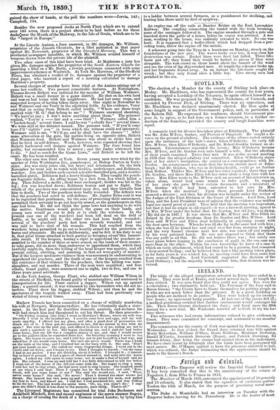SCOTLAND.
The election of a Member for the county of Stirling took place on Moday. Mr. Blackburn, who has represented tho county for four years, having accepted a Lordship of the Treasury, he again offered himself as a candidate. He was proposed by Mr. Stuart Nicholson, of Carnock, and seconded by Provost Dick, of Stirling. There was no opposition, and Mr. Blackburn was declared unanimously elected. He then spoke at some length in support of the Government policy, and, in particular, of the Reform Bill. He expressed his readiness, should Government pro- pose it, to agree, as he had done on a former occasion, to a further re- duction of the franchise, provided the county and burgh franchise were equal.
A romantic trial for divorce has taken place at Edinburgh. The plaintiff was Mr. John M'Iver, banker, and Provost of Dingwall. He sought a di- vorce on the ground of adultery. The evidence of the offence rested entirely upon the testimony of the wife's sister, Ellen O'Doherty. In early life Mrs. Wive; then Eliza O'Doherty, and Dr. Robert Gordon formed an at- tachment. Circumstances separated the lovers ; Miss O'Doherty became Mrs. M'Iver, and Dr. Gordon took unto himself a wife. But the affection of their youth remained. Twice they met. It was at the second meeting in 1856 that the alleged adultery was committed. Ellen O'Doherty states that at her sister's instigation, she carried ou a correspondence with Dr. Gordon. An arrangement was made that the lovers should meet at Edin- burgh ; but Dr. Gordon, who was in declining health, could go no further than Belfast. Thither Mrs. M'Iver and her sister repaired ; there they saw Dr. Gordon, and there Miss Ellen left her sister alone a long time with her lover. Miss Ellen wrote to Mr. M'Iver such an account of this interview as, taken alone, would lead some minds to infer guilt. In support of her story she gave M'Iver certain documents and a miniature of Dr. Gordon which had been entrusted to her care by Mrs. M'Iver when she married ! Upon these grounds Lord Benholme granted a divorce ; and then his decision was brought under the review of the Judges of the First Division of the Court of Session. Lord Ivor, Lord Des; and the Lord President were of opinion that the evidence was neither legal nor moral proof of guilt. They held that the meeting was imprudent, but that it had its origin in old regard—it was a farewell meeting, agreed to by Mrs. M'Iver under the belief that Dr. Gordon, her old love, was dying. [He did die in 1857.] It was shown that Mr. M'Iver and Miss Ellen in- dulged in far greater freedoms than Dr. Gordon and Mrs. M'Iver. Lord Dees said M'Iver and Ellen slept habitually in adjoining rooms with the door open between. When he was ill she lay in the same bed with him ; when she was ill he kissed her and cried over her from morning to night, and the very flannel chemise next her skin was taken off and replaced by his very paternal hands. He was not disposed to think that there was any guilt in all this. He did not believe there was ; but surely one must pause before leaping to the conclusion of guilt in the one ease any more than in the other. Within his own knowledge he know of a case in which an early attachment, which had ceased to be a passion, had remained a deep-seated feeling ; and ho believed that had a like meeting taken place, as for forty years it was wished for, no meeting could have been more free from sensual thoughts. Lord Curriehill supported the decision of the Lord Ordinary ; but the majority being against him, that decision was re- versed.


































 Previous page
Previous page